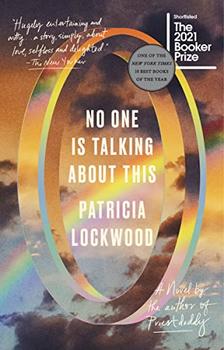Summary | Excerpt | Reviews | Beyond the book | Read-Alikes | Genres & Themes | Author Bio

If anyone knows the ins and outs of living online, it's Patricia Lockwood. Before her stellar memoir Priestdaddy, Lockwood was well known for "Rape Joke," a 2013 self-referential poem that was published on the website The Awl and soon went viral; she's also pushed the boundaries of social media content as literature on Twitter, with her hilarious and sometimes inscrutable "sext" tweets dancing on the lines between poetry, absurdity and obscenity.
The main character of her debut novel No One Is Talking About This, then, feels like a type close to the author. Having become — in a turn of events surprising even to herself — famous for tweeting "Can a dog be twins?," the book's unnamed protagonist now spends her time traveling around the world, appearing as a social media expert at conferences and bookstores, and delivering guest lectures at universities and museums:
During these appearances there entered into her body what she thought of as a demon of performance, an absolutely intact personality that she had no access to in ordinary times.
These rarified moments seem all the more extraordinary when coming from a woman who sits on panels and tries to explain "why it was objectively funnier to spell it 'sneazing.'"
The first half of the novel is largely formless and plotless, consisting of bursts of insight into modern life — especially the internet (which she calls "the portal") — alternating with absurdity and disorientation as the protagonist travels both literally and figuratively through this brave new world: participating in exchanges with total strangers online and with other so-called experts on panels, trading funny texts with her husband and with her sister, who's expecting a baby. Throughout, the narration is fluid, with frequent shifts of perspective between "I" and "she" further off-balancing the reader. In a way, this half of the book feels like the internet itself — disjointed, bawdy, infused with unearned confidence and genuine bewilderment that this is what we have come to, individually and collectively, both despising the online world and being incapable of disengaging from it:
When she set the portal down, the Thread tugged her back toward it. She could not help following it. This might be the one that connected everything, that would knit her to an indestructible coherence.
And then, in a moment, the direction of the novel — and the protagonist's life — changes abruptly: "...her phone buzzed and there were the words, from her far mother, Something has gone wrong, and How soon can you get here?" In that moment, a different kind of life comes rushing in, one in which her sister's unborn baby fails to practice her breathing in utero and, later, is diagnosed with a rare and catastrophic genetic disorder.
This second half is written largely in the same fragmented style, but its focus is drastically different; now its concerns, unlike the portal, are fully embodied, virtually the antithesis of the quips and memes that have been foremost in the protagonist's mind up until this point. Fetal distress, late-term abortion restrictions and, eventually, the immediacy and bodily urgency of life with a newborn take center stage as she embraces a new kind of reality, one that requires very different things of her and that may both change her heart and break it.
It would be simplistic to suggest that what happens in the achingly lovely and at times devastatingly sad second half is a repudiation of a portal-based existence. Even in the midst of grief, it's clear that the protagonist's life and the lives of those around her are inextricable from their online presence. Furthermore, any urge to somehow be transformed into a better version of her prior self is recognized as impossible. "After this I will be able to talk only about what matters, life and death and what comes after," she vows, yet the sentence immediately continues, "but still she went on about the weather."
This is the life we've built for ourselves, Lockwood seems to say, for better or for worse; and even though it's preposterous and shallow and sometimes hurtful, it can also be a way to carve out a moment in history, a place in this world, for the short time we're here to live it.
![]() This review
first ran in the February 17, 2021
issue of BookBrowse Recommends.
This review
first ran in the February 17, 2021
issue of BookBrowse Recommends.

If you liked No One Is Talking About This, try these:

by Kate Greathead
Published 2025
From the author of the critically acclaimed Laura & Emma comes a The Love Affairs of Nathaniel P. for our times: Kate Greathead's razor-sharp but big-hearted excavation of millennial masculinity, The Book of George.

by Sally Rooney
Published 2025
An exquisitely moving story about grief, love, and family―but especially love―from the global phenomenon Sally Rooney.
Your guide toexceptional books
BookBrowse seeks out and recommends the best in contemporary fiction and nonfiction—books that not only engage and entertain but also deepen our understanding of ourselves and the world around us.